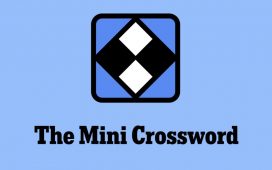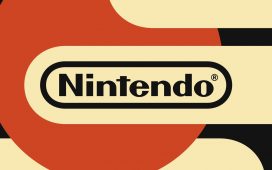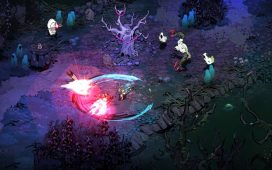No one does a game trade show quite like Devolver Digital. The company set up its faux booth and trailers outside of the Electronic Entertainment Expo (E3), in a parking lot across from the Los Angeles Convention Center. And then it created its zany Devolver Direct online press event (which was really just a silly video) for its new games.
I made my way to the Devolver lot, ostensibly to have a hot dog with Mike Wilson, founding partner at Devolver Digital, during E3. I got a wiener with a corn tortilla, which was quite tasty considering the desperate circumstances of E3.
Then, in the sweltering heat offset by a really loud blowing fan, I caught up with Wilson. We went inside a trailer (yes, an actual mobile home trailer) to get some quiet. Then I interviewed Wilson about the state of indie games and new Devolver titles like Fall Guys: Ultimate Knockout. The company also showed off Carrion, Enter the Gungeon: House of the Gun Dead (an arcade game for 2020), and My Friend Pedro.
I asked Wilson why Devolver had survived for a decade. We also talked about other issues, like the indie game developer revolution, the feared indie apocalypse, mental health issues in game development.
Here’s an edited transcript of our interview.

Above: Mike Wilson at Devolver Digital booth at E3.
Image Credit: Dean Takahashi
GamesBeat: Catch me up on Devolver history. How many years has it been now?
Mike Wilson: We turned 10 this year. We had our birthday party Sunday night, which happened to be the night of our E3 press conference. It was just random synchronicity.
GamesBeat: Did you dig out some facts about how many games you’ve published, things like that?
Wilson: Counting the ones we’ve announced but not released yet, I think we’re up to about 100 games. We released six already this year, and we have 10 more this year. It’s a lot of games.
GamesBeat: Any day now, you’ll beat EA’s release schedule.
Wilson: I know! It was funny. I forget the website that ranks publishers by average Metacritic score, but number of games released is also a factor. Five years ago we showed up right under all the big guys. We were seven people at the time. But we released a lot of games. It was just one of those funny metrics that doesn’t really work. We enjoyed it. I think we were right below Sega or something like that, back before they weren’t a publisher anymore.
We do a lot of games. Every year we say we’re going to do less, but then — the thing is, we’re hitting a point where a lot of the people who’ve made hits for us previously are back with their second or third IP. We’re in an enviable position. I feel like we see most indie stuff first. We pass on more than 20 games a week. It’s not just the garbage that comes in our email, but viable games that are worth considering. As much as we want to do less, so everyone’s not working so hard….
GamesBeat: You’ve become the suits.
Wilson: I don’t know about that? We still get excited about projects. Even though we keep saying we gotta do less next year, we end up doing more. So many of these guys — if we’ve been successful with somebody in the past, they kind of become family. We’re not going to not do their next game. It’s them, plus all the next generation of indies. It stacks up. That’s why we’ve swelled up to 16 people now.
GamesBeat: What’s your most successful game so far?
Wilson: Our single top-grossing game I think is SCUM, which released last year. It was our first game as a service, a big online simulation game. We’re a pretty small company to try to deal with that. It’s funny. I was at Burning Man when it launched, and therefore offline for several days. I came back and checked my email — still at Burning Man, but I couldn’t just be gone for 10 days — and it had blown past our biggest hits in a weekend. We had high hopes for that game, but nothing like that, not doubling our last biggest hit.
Enter the Gungeon is our next best-selling franchise. Part of that is because it’s on so many platforms. It’s been massively successful on Switch. Then the Hotline Miamis and Shadow Warrior, Serious Sam, The Talos Principle. A ton of our success has still come from Croteam, who we started with. They did all the Serious Sam games and then Talos Principle, which is maybe our third or fourth best-selling title.
Enter the Gungeon was made by three guys. Hotline was made by two. Our other best-selling games are made by teams that are a bit bigger, the 3D shooter types of games. Or in the case of Talos a philosophical puzzle game.
GamesBeat: Your identity as the publishing alternative. Do you think that’s still who you are?
Wilson: I think it’s still a first choice if you’re an indie, because we still give everybody a really screaming deal. Whether we’ve never worked with them before or whether they’re the Hotline Miami guys, they get pretty much the same deal. We’ve helped make a lot of indies rich without messing with their art or owning anything. It’s tough to argue with.
We can’t do too many more games. We don’t want to grow a lot. We like the feel of what we’re doing, and we think it’s important that we know all our developers, that we know all our employees. Everybody maintains this close relationship. That’s just not possible with scale. The good news is, there are a lot of other indie publishers now that I hope are giving good deals.
I think owning your IP is the default now, which was not the case when we struck out at all. That was one of our big pillars. We love that, because we can’t grow. We don’t want to do everybody’s game. We can’t. The fact that there are other small publishers that have the same sort of ethos is wonderful for us. It’s nice to be able to say, “Hey, it’s not for us, but go talk to these guys.” We know that they’re not going to get completely screwed.
GamesBeat: How many people are at Devolver now?
Wilson: It’s 16 on staff. That’s up from 12 last year. But I don’t anticipate hiring a lot more. We had to get a couple of people in China, because China became such an important market until it shut down. [laughs] But regularly, even for our indie games, it’s the second or third-biggest market. We had to take that very seriously. We hired Mark Hickey from Apple last year to take mobile more seriously. We hired a CTO that used to be at Steam, John Bartkiw. He was at Steam, and then Devolver, and then Oculus. Now he’s back at Devolver, partially because — SCUM’s success was part of it. We had to trust too much that the developers knew how to handle all the servers and all that. We didn’t have anyone super technical at our company.
We’ve been bolstering the troops with big brains that have chosen to get out of the big companies and take a massive pay cut to work for us, because of the lifestyle. They can work from home and live wherever they want. They can bring their kids to E3 or whatever. We’ve found that to be a huge advantage for us. We get people that we can’t afford because they just have to get out of a campus, wherever they’ve been, whether it’s a big publisher or a platform.
GamesBeat: How much of the original Gathering of Developers fire-and-brimstone vision is there still? That anti-establishment attitude.
Wilson: We poke fun, but we love the industry. When Gathering happened, it was necessary to make noise. Honestly, we didn’t — when we were making a lot of that noise, when we announced the company, we didn’t even know if we were going to get funded. Worst case scenario, we wanted to pull back the curtain on how terribly some of the most successful independent developers in the industry were being treated as far as ownership of their IP. They were making single-digit percentage royalties. These were people that made multi-million-unit hits.
There was no knowledge, no information-sharing back then. That’s why we did the Ten Commandments of what a good deal looked like, because nobody knew. It was heartbreaking for a lot of teams to read that and find out how crappy their deal was. Then we got absorbed by the same evil empire that we were striking out against. But now it feels like the crusade is over. People know what a good deal is now. The indies know. They know they should own their IP. Not all of them still do. I’m sure some of them are still signing bad deals. But at least they know.

Above: A lawnmower at the Devolver Digital booth outside of E3.
Image Credit: Dean Takahashi
Part of it was, the internet was pretty new back then. There just wasn’t a lot of information-sharing in general, never mind about business and money stuff. We feel it’s less necessary to crusade against the industry in a more serious way. Now it’s much more playful. Isn’t this silly? Aren’t loot boxes silly? Whatever it is this year. It’s just fun. We try to remind people that the big companies really can’t do that. We feel like it’s part of our job to say the things that everyone wants to say. But it’s not so much a war against the industry anymore. We’ve found our place. The indies have found their place. Largely just because of digital distribution happening.
GamesBeat: Have you noticed any interesting patterns about the indies? I remember Theresa Duringer’s talk at GDC. She was talking about the whole barter economy that had developed among all the San Francisco studios. Then, a couple years later, she said that all the indies were gone. The rents got too high in San Francisco and they were all forced out. Now San Francisco is almost empty as far as creative talent goes.
Wilson: And they also got hired into the giant companies.
GamesBeat: But it was interesting for me, on that level, to hear about a larger pattern.
Wilson: I’d say most of the developers we work with live somewhere fairly inexpensive. The biggest difference I can see compared to that first generation of indies, like id and Epic and 3D Realms — these guys don’t really aspire to get big. They’re not just doing something small so they can step up and get bigger and build a giant studio. Most of them have this inherent intuition that it’s better to stay small and be free to make what you want to make.
It’s not unlike millennials, the way they don’t buy into the program our generation did. “We need to do this and then get a mortgage and so on.” They’re saying no. The Hotline Miami guys are a good example. They’ve been killing themselves to make their next IP for several years now, and it’s still just the two of them. They’re pretty wealthy guys now. They could hire some help. But they don’t want to. Most of the studios we work with, even though they’ve become immensely successful, are staying small. It’s very freeing. It removes a lot of the artificial pressures.
GamesBeat: What about the arrival of things like the Epic store and the fund they set up to fund a lot of indies? Does that wind up being competition for you?
Wilson: Maybe? Everybody wants to be the Netflix of games eventually. That ends up meaning that you have to deal with Netflix to have a deal. I don’t know how that’s going to go. We get offered exclusive checks and opportunities and whatever from Google and Apple and Microsoft and Sony, and now Epic. We feel like it’s our job to present those to each artist and say, “Look, here’s the deal. You might be giving up something. You might be contributing to the industry being completely fucked for indies in a few years.” If you look at what Spotify did to music, and what Netflix did to indie filmmakers as far as people being actually willing to buy something — those are real possibilities.
GamesBeat: The music industry is actually shrinking.
Wilson: Nobody buys an independent film anymore. iTunes and Amazon and all those platforms — cable VOD doesn’t exist anymore. That’s all down to Netflix. Once you get to the 12 bucks, all you can eat, whatever it is, it’s hard to convince someone to pay 10 or 20 bucks for something they’ve never heard of. The record industry has the same problem. Albums were still $18 when they collapsed, with one or two good songs on there. So there are inherent problems.
GamesBeat: Was there an indiepocalypse, by the way, or….
Wilson: Not that I can tell? It got real crowded. Steam got really hard for indies, especially if you don’t have a publisher at all. It’s interesting. Let me just say on the record that those guys are the only reason we exist, Valve. But also, the Steam team, they intentionally have stayed small. They’re like 30 people. Their answer to staying small, once they became a thing for everybody, was to automate a lot of stuff and say, “Look, we can’t choose and curate. We can’t.” Most of them are engineers. They’re busy making it go for the world. They can’t also be the people saying, “Yes, you, but not you.” It’s a demoralizing thing to do.
GamesBeat: At least until they had the rape game.
Wilson: Right. At some point you have to draw a line. But they just leave it to the community to decide what’s a good game and what’s not, or what’s inappropriate. If there’s something that inflames enough of the community — anyway, that was their answer, the only way they could stay small. Who knows? Who knows how that works out? But there are a lot more channels to find a market than there have ever been. The good news is, all of these platforms actually pay you when they owe you money, which is a new thing in the industry. In the retail days that was not the case. They paid you if they absolutely had to.
GamesBeat: I wonder why Steam hasn’t chosen to match Epic’s percentage, 12 percent.
Wilson: Everyone’s waiting to see what they will do. They’re definitely paying attention. We have a pretty close relationship at this point. We release so many games, and every one of our games is on PC. There’s nothing that’s not on PC. We have that conversation sometimes. They’re internally trying to figure out how to respond. Do we need to adjust? Why did you sign this exclusive? Things like that.
For us, we just really leave it up to each developer. Here’s the opportunity. It’s up to you. Just like every screenshot or every quote or whatever we do is ultimately up to the artist. Different artists — we do express our concerns over things like streaming services and all these things we’ve been talking about. But ultimately we leave it up to each artist to make their own choice.
They do make very different choices. There’s different levels of fear. Some of them are super happy to take a check that means they’re definitely not going out of business next year after their game launches. Others say, “No, we believe in our project. We believe in our upside.” Those are usually ones that are more financially stable because they’ve been successful in the past.
But all we know for sure is we don’t know what’s going to happen. Staying small is the best answer to not knowing, being able to move with whatever works. Even though these are giant companies making these efforts — Apple, Google – we’ve seen them all fuck things up before, hugely. I don’t know when the last time is you checked your Google+ or your Google Wave or your Google Buzz, but just because these are giants coming in, it doesn’t make this all inevitable.
Somebody will do it right, and I really — my heart tells me — I want to trust that Epic will do the right thing, in the same way that Valve will, because they come from being an independent developer. When I was at id, Epic was a small company. That was the race. It was Sweeney and Carmack and our little teams, Quake and Unreal. I know for a fact that every decision relating to that store right now is still down to Tim Sweeney, as big as they’ve become.
Somebody has to be in charge at some point, and I think that’s the best we can hope for, that it’s a Tim Sweeney or a Gabe Newell, somebody that came from doing this because they love it and they’ve been in it for that long. They’ve seen it all come ago. They’re wealthy enough that they’re not tempted. They’re not trying to go public and be the next Google. My money is on those guys to win, and I hope they do.

Above: I had a hot dog, or a wiener with a tortilla, at E3 with Mike Wilson.
Image Credit: Dean Takahashi
GamesBeat: What about curating for you guys? Of those 16 people, how many are weighing in on what you should publish?
Wilson: Sometimes everyone. There are 16 individuals, and everyone likes different types of games, or can — if you’ve never played a tycoon game or whatever — we released Weedcraft recently, and that was our first tycoon game. Not a lot of people at Devolver play those types of games, so a lot of people were like, “I’m out.” But everyone is welcome to. There’s no real hierarchy. There’s no final decision-maker. It’s a consensus thing.
GamesBeat: Have you guys developed some sensibility for what you will do and what you will stay away from?
Wilson: Yeah, but it’s — we don’t have a road map. It’s very fluid. Really, if you’re small and you don’t take advantage of being small, it’s the worst place to be. If you’re small, you’d better be nimble and willing to evolve, because your advantage is being able to do that when big companies can’t. You can do it much more quickly.
GamesBeat: You see edgy stuff, but not necessarily having to exercise that sort of discretion that much.
Wilson: No. It’s interesting. I’d say probably our most edgy game, possibly, would have been Genital Jousting a couple of years ago. But that was specifically made by Free Lives, the guys who made Broforce, to make a statement about how ridiculous it is that violence is okay, but we’re so afraid of our own body parts and sexuality, and the homophobic thing in the industry. It’s such a strange place for machismo in the video game industry. [laughs] But it exists!
So they made that game. It was a party game. I don’t know if you’ve seen it. Testicles chasing each other around. They made it an eight-player party game, which means their ultimate vision was two dudes having to share a controller while they were doing this. They just wanted to make fun of how ridiculous it is that we’re afraid of things like that, yet we’re super okay with ripping up somebody’s spine out and dangling it in front of them.
That’s why that game was interesting. It wouldn’t be interesting if it was just a dick joke. It was interesting because it was making an artistic statement about the industry. It still wouldn’t have been cool, except the game was also very fun. It was very well-made, very well-balanced, and it’s been very successful. But Twitch couldn’t show it, because of the Amazon guidelines or whatever. We had fun with that too. We put the little black boxes over everything.

Above: Fall Guys: Ultimate Knockout
Image Credit: Devolver
It’s the same thing with Weedcraft. I don’t know if you followed all my rants on that, but the fact that we were having YouTube videos, streamers, get demonetized because YouTube has a policy about promoting drugs — this game is not promoting drugs. It’s an examination of the industry. The developers don’t even smoke weed. We’re not trying to say that drugs are great. We’re trying to say, “Isn’t this an interesting time in this industry? It’s this semi-Prohibition-era thing.”
All of our other games are about murder! Which is illegal everywhere, by the way, but no problem. Occasionally we still find ourselves in a really funny place with where the industry is at, maturity-wise. Facebook also blocked our ads for that game. With Facebook I was actually able to get to a human being and say, “Hey, you’re probably not a gamer, but this is kind of like a documentary about the industry. It’s a super educational industry sim. We’re not selling drugs.” And then they said, “Oh, that makes sense,” and they changed it to where we could sell ads.
I still haven’t been able to get to a human being at YouTube to have that conversation. It’s interesting. YouTube’s policy, part of it is a section about promoting drugs or other illegal things. The next one is about, except for educational and artistic purposes. Look at all the music videos and documentaries about weed. They still don’t see games in there. I can’t get a human being to have that conversation.
Honestly, I wanted to sue YouTube, just to raise awareness of that silliness, and they honestly did — to sue somebody and win you have to prove damages, and I can tell you, that cost that game’s trajectory quite a bit. Part of our math for making that game was that YouTubers would love it. They love these types of games, and it’s really interesting subject matter. Sure enough, when it launched, there was a ton of YouTubers doing it, and as soon as they got demonetized, which was in about two days, they all stopped doing it. That has a real effect on an indie game like that. The same day we got all our ads shut down.
We don’t have massive marketing budgets. Social media is integral to the success of anything we do. Harry decided that suing Google probably wasn’t — he encouraged me to do it personally, but not as Devolver. [laughs] It stinks. But it also makes it interesting, that there are still those barriers that makes it worth pushing the envelope with this artform. To just say, “Guys, what are we talking about here? Why is super-realistic violence okay? Promoting war, whatever it is. But growing weed….“

Above: Devolver
Image Credit: Devolver Digital
GamesBeat: There’s a funny thing now with EA and their EA Partners program. The next game they’re going to publish is Sea of Solitude, this game about loneliness, that was conceived by one woman. They found that this was an interesting story to tell. One of the biggest companies in the industry….
Wilson: It’s like the big studios that do the movie that was clearly for an Oscar push. [laughs] They make all their comic book movies to make money, and then they do this emotional indie thing to win an Oscar. But I love that EA does that.
It’s wonderful that — and honestly, that’s been the most — we were talking about trends and the differences between Devolver and our old companies. The fact that engines have become ubiquitous or free, you’re getting a lot more women and people of color and just people from around the world that never could have written the $500,000 check just to get started. The storytelling is becoming much more interesting, especially in the indie world, where a couple of people can still make a game that matters. That’s super important, because any time it gets too big, there are too many people to say no to ideas like that.
I guarantee that Sea of Solitude, that struck a nerve with a gatekeeper that’s probably experienced that. The conversation around mental wellness — I really prefer to refer to it as “wellness,” because our minds are not separate from our bodies. You’re either healthy or you’re not. You can be sick in any part of your body or your brain. I love that that’s become such a conversation in our industry in the past couple of years, because these things are so engaging.
These digital platforms — again, if you’re a small team — none of our games are mass-market. Nobody on the street has heard of our stuff, for the most part. That’s fine. We’re doing fine. The developers are doing fine. It gives you the opportunity to tell those stories. It can just be for that person that needs to find it. It doesn’t have to be for the world. I love that.
GamesBeat: You’ve been fairly outspoken on Facebook [about caring about mental health issues in gaming].
Wilson: Well, somebody has to be. Like I said about Devolver, a lot of the stuff we say, the antics — if you watch our press conferences, we’re just, “Hey, isn’t this silly?” We do that because the big companies often can’t. It’s not that the people in those big companies don’t feel that way. They just don’t have permission. We can say whatever we want, and I as an individual, not representing Devolver, can do the same.
I can say I was very nearly suicidal at one point in my life. I have mental and physical health issues throughout my family like everyone else. I feel like if you’ve got — I don’t have the biggest megaphone in the world, but I have some people that follow me. I feel like it’s kind of your job to say something besides showing vacation pictures. “Hey, this is real. If you happen to be reading this, I too feel this way sometimes. Nobody’s immune to it.”
A lot of our developers — that was part of it. We had several developers hospitalized over a couple of years while making their games, or just after, from the stress. I would kind of be a jerk if I didn’t say something about that. Again, most of the people that benefit from that, I don’t feel like we ever hear from them. It’s just this ripple out there that’s happening. Somebody saw something they needed to see that day. With all the garbage coming at us every day, all the reasons to be depressed, I think it’s important to talk about it.
GamesBeat: Do you ever see many pitches coming in as far as games for seniors, older people?
Wilson: No, not really. But as we get older, we’re that first generation.
GamesBeat: There’s some movement toward tech for older people.
Wilson: Yeah, but it’s mostly a demographics cash grab right now.
GamesBeat: It’s not so much about entertainment.
Wilson: No. You see clumsy efforts in the movie theaters to adapt. “This is the fastest-growing demographic! We need to have movies with gray people in them.” But they don’t feel that genuine a lot of times. We have a lot of people who’ve been making games for a long time, getting into their 50s and 60s now. I think instead of a demographic thing, you’ll just naturally see that happen. People will make games for themselves. The best games are made by people who are making what they want to play. Whatever that looks like, I don’t think we know. But my gut tells me it’ll be a bit less hyper-violent, a little less shocking.
GamesBeat: Grand Theft Alzheimer’s?
Wilson: [laughs] Oh my God. What are those called, those little scooters people drive? I can’t remember. What are those called? The things in shopping centers. Anyway. Grand Theft whatever those are called. Aren’t we lucky to still be doing this?






